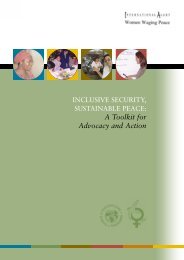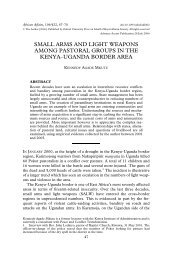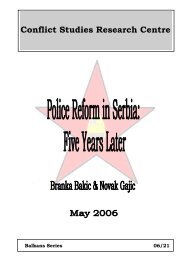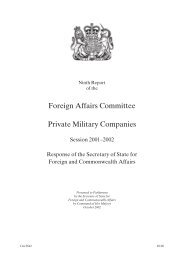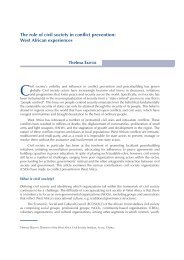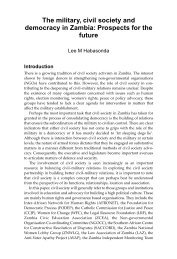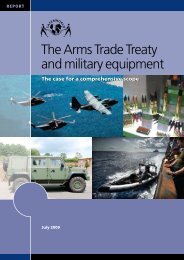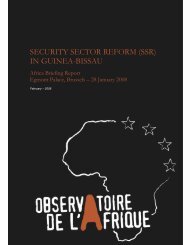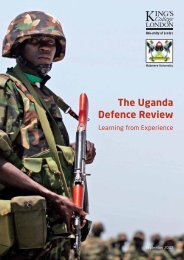promoting security sector reform in fragile states - GFN-SSR
promoting security sector reform in fragile states - GFN-SSR
promoting security sector reform in fragile states - GFN-SSR
You also want an ePaper? Increase the reach of your titles
YUMPU automatically turns print PDFs into web optimized ePapers that Google loves.
assistance agencies work<strong>in</strong>g on <strong>SSR</strong>-related<br />
activities with m<strong>in</strong>istries of foreign<br />
affairs, defense, and justice; national<br />
police services; armed forces; customs<br />
services; corrections services; and offices<br />
of the solicitor general. DAC recommends<br />
tak<strong>in</strong>g “a whole-of-government”<br />
approach to <strong>SSR</strong>. This requires build<strong>in</strong>g<br />
partnerships across departments and<br />
agencies to ensure that the body with the<br />
appropriate competence provides <strong>SSR</strong>related<br />
support to <strong>reform</strong><strong>in</strong>g countries<br />
(OECD 2004, 8).<br />
What Are the Central<br />
Elements of an <strong>SSR</strong> Agenda?<br />
The desirability of strengthen<strong>in</strong>g<br />
democratic governance of the<br />
<strong>security</strong> <strong>sector</strong> is <strong>in</strong>creas<strong>in</strong>gly<br />
evident <strong>in</strong> develop<strong>in</strong>g countries, particularly<br />
among civil society. For example,<br />
the Southern African Defence and Security<br />
Management Network (SADSEM)<br />
seeks “to contribute to effective democratic<br />
management of defence and <strong>security</strong><br />
functions <strong>in</strong> Southern Africa and to<br />
strengthen peace and common <strong>security</strong><br />
<strong>in</strong> the region” by provid<strong>in</strong>g tra<strong>in</strong><strong>in</strong>g and<br />
education courses and develop<strong>in</strong>g the<br />
capacity of local researchers. Similarly,<br />
the Centre for Democracy and Development<br />
(CDD) <strong>in</strong> Lagos and African<br />
Security Dialogue and Research (ASDR)<br />
<strong>in</strong> Accra have worked with SADSEM to<br />
promote dialogue on such key <strong>security</strong><br />
<strong>sector</strong> issues as professionalism, transparency,<br />
accountability, and confidence<br />
build<strong>in</strong>g. CDD and SADSEM have<br />
sought to comb<strong>in</strong>e expert analysis of<br />
<strong>security</strong> issues with dialogue, policy development,<br />
and capacity build<strong>in</strong>g across<br />
10 See and <br />
for <strong>in</strong>formation on SADSEM and CDD.<br />
the <strong>sector</strong> and have <strong>in</strong>fluenced emerg<strong>in</strong>g<br />
<strong>in</strong>ternational <strong>SSR</strong> <strong>in</strong>itiatives. 10<br />
A DAC-sponsored survey of <strong>SSR</strong> activities<br />
<strong>in</strong> Africa, Asia-Pacific, Lat<strong>in</strong> America<br />
and the Caribbean, and southeast<br />
Europe and the Baltics reveals a more<br />
mixed picture. While there is a significant<br />
amount of activity underway <strong>in</strong><br />
the <strong>security</strong> arena, a good deal <strong>in</strong>itiated<br />
by the countries themselves, much of<br />
it focuses on strengthen<strong>in</strong>g the operational<br />
capacity and effectiveness of the<br />
<strong>security</strong> forces rather than strengthen<strong>in</strong>g<br />
democratic oversight and accountability<br />
mechanisms.<br />
As the Africa survey noted, the significant<br />
<strong>in</strong>crease <strong>in</strong> violent crimes on the<br />
cont<strong>in</strong>ent <strong>in</strong> recent years—often <strong>in</strong><br />
conjunction with efforts at democratization—may<br />
be mak<strong>in</strong>g members of<br />
the public more tolerant of questionable<br />
behavior by <strong>security</strong> forces. Rather<br />
than back<strong>in</strong>g away from the governance<br />
agenda at the heart of <strong>SSR</strong>, African<br />
analysts concluded that both operational<br />
and governance perspectives should<br />
be <strong>in</strong>corporated <strong>in</strong>to <strong>SSR</strong> activities. In<br />
their view, this would ensure “effective<br />
law enforcement and public order<br />
<strong>in</strong> the context of accountability and<br />
good governance of the <strong>security</strong> system<br />
and…avoid excessive emphasis on deficit<br />
reduction and fiscal stabilization likely<br />
to disable <strong>security</strong> <strong>in</strong>stitutions even<br />
further” (OECD 2004, 50)<br />
This suggests that three ma<strong>in</strong> challenges<br />
must be addressed when seek<strong>in</strong>g to<br />
strengthen democratic <strong>security</strong> <strong>sector</strong><br />
governance. They are to develop<br />
• a legal framework consistent with <strong>in</strong>ternational<br />
law and good democratic<br />
practice that reflects local values and<br />
is implemented<br />
• civil management and oversight<br />
mechanisms and ensure they function<br />
as <strong>in</strong>tended<br />
• viable and affordable <strong>security</strong> bodies<br />
capable of provid<strong>in</strong>g <strong>security</strong> for <strong>in</strong>dividuals,<br />
communities, and the state;<br />
appropriate to tasks assigned; and<br />
accountable to democratically elected<br />
civil authorities and civil society<br />
Tasks for Local Stakeholders<br />
Six tasks confront develop<strong>in</strong>g and transition<br />
countries attempt<strong>in</strong>g to address the<br />
<strong>SSR</strong> challenges:<br />
1. Develop accountable and professional <strong>security</strong><br />
forces. While professional <strong>security</strong><br />
forces offer no guarantee that democratic<br />
civil control will be established or<br />
ma<strong>in</strong>ta<strong>in</strong>ed, build<strong>in</strong>g the professional<br />
capacity of the <strong>security</strong> forces is critical.<br />
Professionalization should encompass<br />
doctr<strong>in</strong>al development, skill development,<br />
rule orientation, <strong>in</strong>ternal democratization,<br />
and technical modernization.<br />
The process should emphasize the<br />
importance of accountability, both to<br />
elected civil authorities and civil society,<br />
and the necessity of adher<strong>in</strong>g to democratic<br />
pr<strong>in</strong>ciples and the rule of law.<br />
Officers need to possess a strong management<br />
capacity to ensure that <strong>security</strong><br />
forces operate <strong>in</strong> a manner consistent<br />
with democratic practice.<br />
2. Develop capable and responsible civil<br />
authorities. Authorities <strong>in</strong> executive and<br />
legislative branches of government must<br />
have the capacity to manage the <strong>security</strong><br />
<strong>sector</strong> and fulfill oversight functions.<br />
Relevant governmental and nongovern-<br />
8 USAID ISSUE PAPER NO. 11






